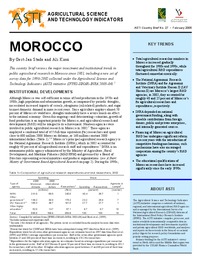Authors:
Stads, Gert-Jan; Kissi, Ali
Year:
2005
Publisher
International Food Policy Research Institute (IFPRI); and National Agronomic Research Institute (INRA)
Back to:
Since the beginning of the 1980s, agricultural researcher numbers in Morocco have steadily risen. Agricultural R&D spending followed a more erratic trend in response to fluctuations in national government funding and (foreign) donor support, though spending has trended steadily upward in recent years, given the Moroccan government’s renewed commitment to developing the agricultural sector. Morocco’s principal agricultural R&D agency, INRA, was highly dependent on government funding throughout 1991–2002, particularly because donor funding contracted over that time. However, the World Bank–led PRV initiative successfully strengthened the
institute’s management in the 1990s, in part by decentralizing many of its research activities.
INRA and the higher-education agencies also began to generate considerable shares of their funding through the sale of products and services, entering into numerous national and international research contracts. This is a very positive development, and one with substantial prospects for future growth. The introduction of competitive funding mechanisms is another positive development since the late 1990s, and one that has already promoted collaboration among the various agencies within Morocco’s national agricultural research system. Competitive funding programs have also successfully promoted effective and synergistic research practices, leveling the playing field among Morocco’s agricultural R&D agencies and compelling them to make efficient use of their scarce resources. Accompanying these changes has been significant improvement in researcher qualifications within the system in terms of the proportion of researchers holding PhDs.

